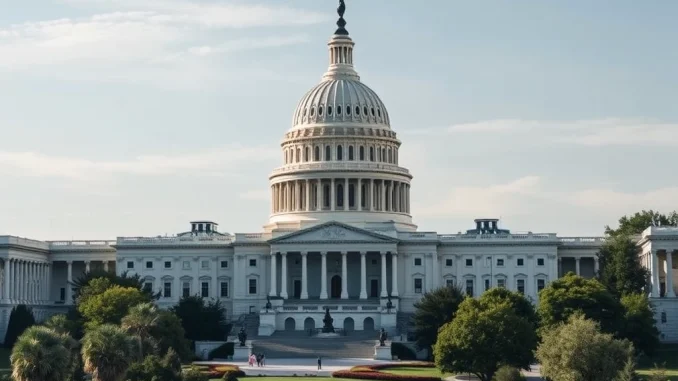
Attention, crypto enthusiasts! A significant development is unfolding in Washington D.C. that could have major implications for the digital asset market, particularly concerning stablecoins. The process for establishing formal stablecoin regulation US is picking up pace, with a key legislative maneuver recently taking place in the U.S. Senate.
Key Senate Action on Stablecoin Regulation US
According to reports from Crypto in America host Eleanor Terrett on X, U.S. Senate Republican Leader John Thune has taken a decisive step regarding the proposed stablecoin legislation. Senator Thune has officially filed cloture on both the bipartisan amendment attached to the GENIUS Act and the main bill itself.
This action sets the stage for a vote on the measure this week. For the bill to advance past this procedural hurdle and move towards potential passage, it will require significant support, needing 60 votes in the Senate.
What Does Filing Cloture Mean?
For those unfamiliar with the intricacies of the U.S. legislative process, filing cloture is a critical procedural move. Here’s a simple breakdown:
- Ending Debate: In the Senate, unlimited debate (filibuster) can block a vote on a bill or amendment. Cloture is the only procedure by which the Senate can vote to place a time limit on consideration of a bill or other matter, thereby overcoming a filibuster.
- Requiring 60 Votes: To invoke cloture and end debate, a supermajority is required. Specifically, three-fifths of the Senators duly chosen and sworn, which is currently 60 votes, must agree.
- Setting Up a Vote: Once cloture is successfully invoked, debate time is limited, guaranteeing that a final vote on the measure will eventually take place.
Senator Thune’s action signals a push to move the US Senate stablecoin bill forward and force a vote, preventing potential delays or filibusters on both the core bill and any accompanying amendments.
Understanding the GENIUS Act
The legislation at the heart of this development is often referred to as the GENIUS Act (“Getting a Nation on Board to Undertake Innovation and Success Act”). While the exact details of the latest version or specific amendments aren’t fully public in this brief update, previous discussions around stablecoin bills have aimed to establish a clear regulatory framework for these digital assets.
Stablecoins are cryptocurrencies designed to maintain a stable value relative to a specific asset or basket of assets, often the U.S. dollar. They play a crucial role in the broader crypto ecosystem, facilitating trading, lending, and payments. However, their stability and potential for widespread use have also raised concerns among regulators regarding financial stability, consumer protection, and illicit finance.
A dedicated framework for stablecoin regulation US seeks to address these concerns by potentially:
- Defining stablecoins legally.
- Establishing requirements for stablecoin issuers (e.g., reserve requirements, audits).
- Assigning oversight responsibility to specific regulatory bodies (like the Fed, OCC, or state regulators).
- Setting rules for stablecoin platforms and service providers.
Why is Crypto Regulation US So Important Now?
The push for crypto regulation US, particularly for stablecoins, stems from several factors:
- Market Growth: The stablecoin market has grown significantly, increasing its potential impact on traditional finance.
- Risk Mitigation: Regulators aim to prevent scenarios like the collapse of algorithmic stablecoins, which caused market instability.
- Consumer Protection: Ensuring users’ funds are safe and stablecoin reserves are adequate is a priority.
- Global Competitiveness: Establishing clear rules could position the U.S. as a leader in the digital asset space.
- Illicit Finance: Creating a framework helps address concerns about stablecoins being used for illegal activities.
The actions taken by figures like John Thune crypto engagement highlights the increasing attention digital assets are receiving at the highest levels of government.
What to Watch For This Week
The filing of cloture means the focus now shifts to the upcoming vote. The requirement for 60 votes signifies that the bill needs bipartisan support to overcome potential procedural hurdles. This is often a challenging threshold to meet in a closely divided Senate.
The outcome of this cloture vote will largely determine the immediate future of the GENIUS Act and potentially broader crypto regulation US efforts this year. A successful cloture vote would pave the way for a final vote on the bill itself shortly thereafter.
Challenges and Outlook
Passing comprehensive stablecoin legislation has been an ongoing challenge in the U.S. Congress. Disagreements persist between parties and even within parties regarding the scope of regulation, the appropriate regulators, and the balance between innovation and risk mitigation.
Senator Thune’s move indicates a strong desire from some corners of the Senate to advance the discussion and potentially pass legislation. However, the 60-vote requirement means negotiations and compromises may still be necessary to secure passage.
Industry stakeholders are closely watching, hoping for clarity and a predictable regulatory environment, while consumer advocates and some regulators push for robust oversight.
Summary: A Pivotal Moment for Stablecoins
Senator John Thune’s filing of cloture on the GENIUS Act marks a significant procedural step for the US Senate stablecoin bill. It forces a crucial vote this week that will test the Senate’s ability to move forward on establishing formal stablecoin regulation US. The need for 60 votes underscores the requirement for broad consensus. The outcome of this vote will be a key indicator of the likelihood of federal crypto regulation US advancing in the near future, shaping the landscape for digital assets for years to come.



